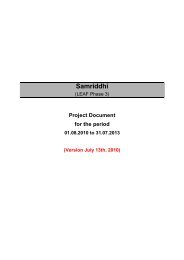BUSINESS DEVELOPMENT SERVICE ASSESSMENT REPORT
BUSINESS DEVELOPMENT SERVICE ASSESSMENT REPORT
BUSINESS DEVELOPMENT SERVICE ASSESSMENT REPORT
Create successful ePaper yourself
Turn your PDF publications into a flip-book with our unique Google optimized e-Paper software.
they sell their wool and cashmere to changers offering the highest prices. 12<br />
respondents previously participated in trade fairs and market days organized by local<br />
government and Chamber of commerce and they all found it useful for selling and<br />
advertising their produce, studying other competing products, exchanging skills and<br />
know-how and sharing knowledge on raw materials and production.<br />
Production inputs<br />
Key inputs for herding businesses are considered hay grass, fodder, veterinary service<br />
and breeding animals. Herders prepare hay grass themselves (4), buy (6), procure<br />
fodder (8), make themselves (1) and some even never use (1). For the total of 5066<br />
livestock owned by 10 herders surveyed, 42.2 tones of hay grass and 4.2 tones of<br />
fodder is prepared and used throughout the year Herders buy hay grass and fodder<br />
locally or nearby soums (Baruunturuun and Tes soums) or procure from aimag center or<br />
Hartolgoi and Teel areas spending 4.05 million MNT for the overall amount of fodder and<br />
hay grass.<br />
4 of 10 herders buy veterinary service frequently, while remaining 6 buys only a few<br />
types of vet services. All herders get their animals vaccinated. Some buy pharmacy for<br />
de-worming, but some do not often get their animals washed as they do not prefer spray<br />
method that rural vets often use. Some herders, who also tend some limited number of<br />
animals of other people, get all animals vaccinated as there is higher likelihood of cross<br />
infection in case some are omitted. A GTZ funded project is being implemented in<br />
Tarialan soum which will provide all necessary veterinary services to selected herder<br />
households for three year period as a pilot project.<br />
Herders change breeding animals for every three years stating that they change with<br />
other herders from the same soum or bagh (8) or some get their breeding animals from<br />
other soums (2). They take an active part in the elite breeding animal fair to compare<br />
quality and yield of their own herd.<br />
Non herding businesses require wide variety of inputs for their businesses. At the initial<br />
stage, they travel to Ulaanbaatar or Ulaangom to buy materials themselves, then for the<br />
second time they order their friends or relatives in the city to send exactly the same<br />
materials. It is very common that this informal input supply network results in sending<br />
wrong or low quality materials, so the businesses encounter difficulties in the course of<br />
their businesses. Aside from this, a vegetable planting business operators of Tarialan<br />
soum buys the seed and seedling from the scientific institute of neighboring Russian city<br />
of Barnaul as well as all required information and advice of planting and caring. None of<br />
the planting business operators use chemical fertilizers; instead they extensively use<br />
organic substances such as manure, which is widely available for free.<br />
Equipment<br />
Business operators purchased their lemonade and water bottling equipment from<br />
Urumqi of China, intestine processing equipment from Holland, felt making equipment<br />
from Ulaanbaatar and other small equipments for ice cream & bakery from Ulaangom<br />
town. Maintenance and repair is mainly taken care business operators themselves and<br />
many of them order to as far as UB for spare parts. There is no any place where they<br />
can get information on equipment, only a few businesses use newspapers for equipment<br />
related info.

















